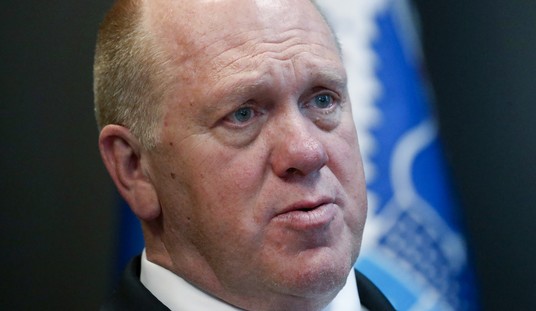In the wake of President Obama’s moronic and widely-lampooned comments on judicial review yesterday, President Obama offered the following lame (and incorrect) walkback today:
THE PRESIDENT: Well, first of all, let me be very specific. We have not seen a Court overturn a law that was passed by Congress on a economic issue, like health care, that I think most people would clearly consider commerce — a law like that has not been overturned at least since Lochner. Right? So we’re going back to the ’30s, pre New Deal.
And the point I was making is that the Supreme Court is the final say on our Constitution and our laws, and all of us have to respect it, but it’s precisely because of that extraordinary power that the Court has traditionally exercised significant restraint and deference to our duly elected legislature, our Congress. And so the burden is on those who would overturn a law like this.
The President, of course, is once again either displaying complete ignorance or cynical hackery. Our federal Congress, per the constitution, is a Congress of enumerated powers. It may only do the things which it is authorized to do under Article 1, Section 8. The onus is always on Congress to demonstrate that its actions have fallen within one of its enumerated powers, not on a person challenging an act of Congress to demonstrate that Congress has acted without those powers. However, more importantly, as Powerline pointed out, Obama has once again also gotten his history wrong:
Is there any truth to Obama’s claim that the Supreme Court hasn’t invalidated any statutes that are “economic” and relate to “commerce” since Lochner v. New York, which was in 1905? Of course not. To name just a few examples a great deal more recent than 1905, the Court ruled unconstitutional provisions of the Sarbanes-Oxley Act that had permitted only “for cause” removal of members of the Public Company Accounting Oversight Board in 2010; the 1990 Mushroom Promotion, Research and Consumer Information Act in 2001 (this case was actually quite similar to Obamacare because the Court held unconstitutional provisions that required mushroom growers to contribute to mushroom promotion programs); provisions of the Patent and Plant Variety Remedy Clarification Act, the Trademark Remedy Clarification Act, and the Copyright Remedy Clarification Act in 1992; the Harbor Maintenance Tax Act in 1998; the Transfer Act which authorized the transfer of operating control of Washington National Airport and Dulles International Airport from the Department of Transportation to the Metropolitan Washington Airports Authority in 1991; and many, many more dating back to 1905.
Obama’s bungling on this (which has yet to be called a “gaffe” or more properly “a series of lies” by anyone I’ve yet seen in the media) prompted the Fifth Circuit yesterday to ask a DOJ lawyer who was litigating a case concerning Obamacare to clarify whether the DOJ was now taking the position that the federal judiciary did not have the power to overturn Obamacare. Some folks on the left went absolutely apopleptic over this, because it was an unusual event. Mostly, however, that is because most lawyers aren’t cursed with clients who are dumb enough to say, on the news, that the court currently deciding their case has no legitimate authority to do so. As was pointed out at Hot Air, Obama is the head of the DOJ and the Fifth Circuit was entitled to know if Obama’s statements signaled a change in the government’s position during this litigation.
One final point is in order here, which is to clarify for President Obama what is meant by an activist judiciary. An activist judiciary is not one that strikes down laws passed by Congress. An activist judiciary is one that strikes down laws passed by Congress for reasons that cannot be fairly said to be contained within the text of the Constitution, or more properly one that invents law from the bench.
Allow me to helpfully illustrate. Most conservatives were in favor (generally speaking) of the Gramm-Rudman-Hollings Act, which was passed with broad, bipartisan support in both chambers of Congress. When the Supreme Court struck this act down, I don’t recall any conservative accusing the Court of engaging in judicial activism, because the Court’s reason for striking the bill down was firmly rooted in the text of the Constitution. By way of contrast, an excellent example of judicial activism would be virtually every SCOTUS Eighth Amendment decision for the last 65 years. The plain text of the Fifth and Fourteenth Amendments indicate that the government can constitutionally take a person’s life (so long as he or she is afforded due process of law). At the time these amendments were enacted, capital punishment was virtually the uniform punishment for all felonies. Nonetheless, the Supreme Court has taken it upon itself to declare the death penalty unconstitutional for every crime other than murder, despite the fact that neither the text of the constitution nor history compels this result. At one point, the Supreme Court actually declared that the death penalty was unconstitutional, despite the fact that the constitution explicitly provides for the death penalty. This is what is meant by “judicial activism,” not “striking down statutes that were passed by Congress.”
It would be helpful, if the President wants to debate using conservative terms, if he took the time to understand what they meant.













Join the conversation as a VIP Member